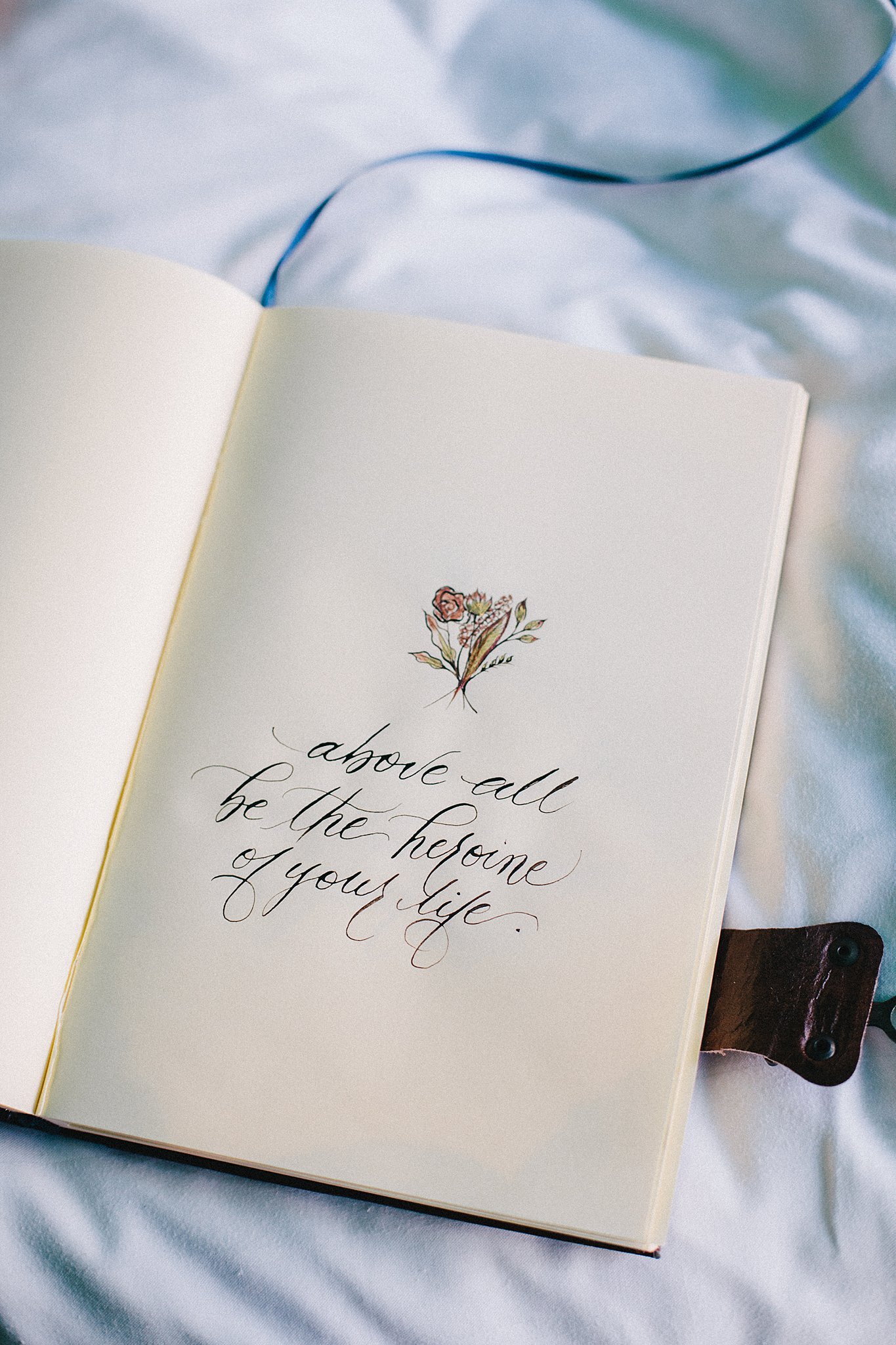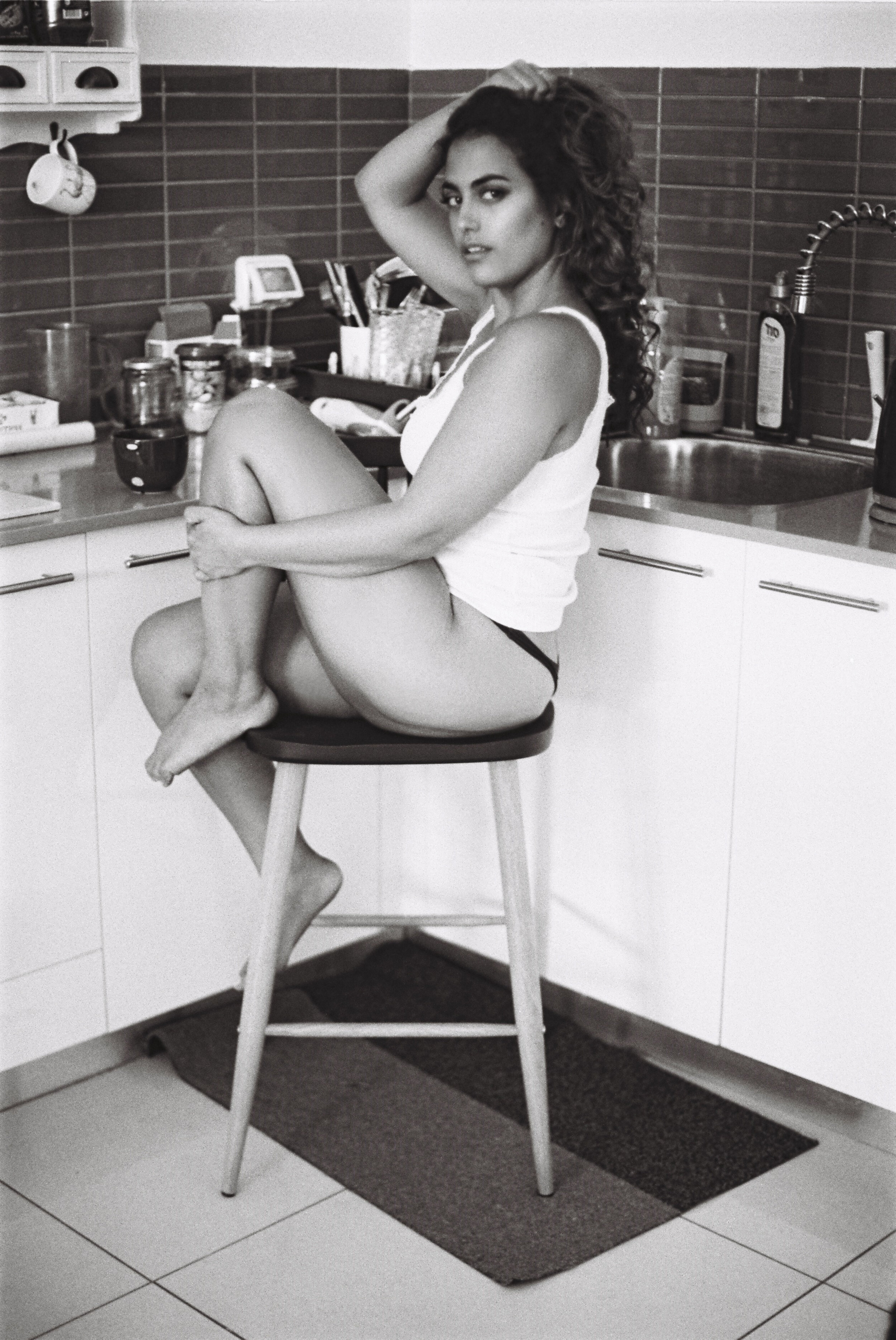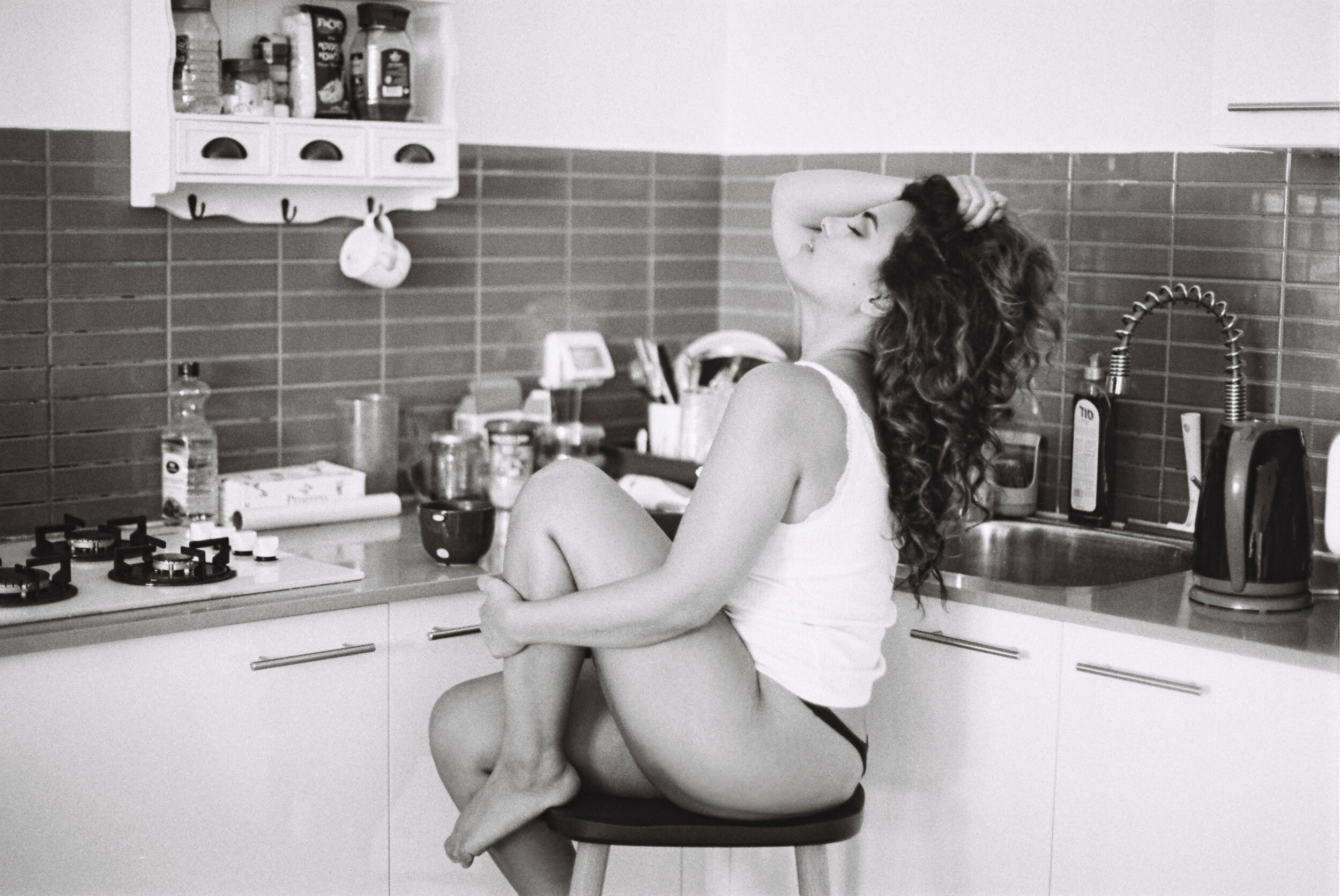Rebecca: Hi, thank you for being here! Can you tell me a little background information about yourself?
Husband: We’ve been married for about 10 years. We have four kids, and I work in high tech.
Wife: I am currently pursuing a PHD.
Husband: I spent 10 years in yeshiva after high school, and I received Rabbinical certification. At certain points in my career, I thought I might be a professional Rabbi, but I ended up not going that route. I still teach regularly and give a weekly shiur to this day.
Wife: We try to make sure that Torah is central in our home. Obviously, it can’t be everything that we do, but it is still a very vibrant part of our lives. We learn with our kids so that they grow up with a love and appreciation for it.
Rebecca: That’s so beautiful!
(To wife) Why did you first reach out to me for a boudoir session, and what were you hoping to get out of it the first time?
Wife: Wow, that was a while ago! It must’ve been 5 years ago.
Husband: (Interjects) The pictures are still up in our room. In a closet, up high where the kids can’t really reach it. It would be awkward if they ever opened it!
Whenever my wife is in niddah (intimate separation during marriage), I take the pictures down and when she goes to the mikvah (ritual bath before becoming intimate again), I put it back up. It’s a whole procession.
Wife: I really loved the pictures of yours that I had seen. I thought they were very unique and beautiful and highlighted really beautiful parts of different women. Somehow the idea just kept coming back to me. I was talking to one of my really close friends and said, “Can I tell you something crazy? I’ve been thinking about doing a boudoir session.” and she said, “Oh my gosh, me too!” and she lives in the states. We kind of made a pact that we would both do it.
I had a really traumatic birth experience. This session was a journey towards reclaiming myself physically because I felt like my body had let me down. I started working out very seriously afterward, and the session was a way to reward all of the hard work I had put in.
Rebecca: (To husband) Were you supportive of her desire to do the session from the beginning?
Husband: Was I supportive? Very! This is where it gets a little bit difficult to discuss, just given the dynamics of the conversation. Ultimately, I am a religious individual and understand the place of sexuality within the framework of my life. But I am still a guy. Was I supportive? I was supportive, excited, thrilled, beyond … there were no words.
Rebecca: You’d be surprised, there are men who are not so supportive of this.
Husband: That is shocking.
Rebecca: This is one of the reasons I wanted to interview you because of those things that come up sometimes.
Wife: When I brought it up to him the first time, his eyes kind of bugged out of his head and he said, “Wow you’re going to do that?! That’s amazing.”
Husband: I went out and I bought her jewelry. We were on a tight budget then since I was in yeshiva. Even so, I figured it out and bought a piece of jewelry for her to wear during the session.
Rebecca: Did you ever feel like doing a boudoir session was a conflict of your religious beliefs?
Wife: Not when I knew it was going to be a private experience and not shared with anyone.
Husband: This is where I think we’re going to touch on the fundamental issue. I think that especially in the states, there’s been a reaction to the hypersexualization of society at large. The knee-jerk reaction is that sexuality is bad.
When I was 15 in a modern Orthodox high school, we had one class about the evils of masturbation. The message was that it was the worst thing you can do, that it’s worse than killing people and this and that.
If you want to have a conversation about it being technically forbidden, fine. But it needs to be contextualized, and there needs to be support. All it did was set up this idea that sexuality = bad.
One of the things that they taught us, as I was learning to be a Chatan teacher (pre-marriage teacher for grooms), is that we have to de-program.
Wife: I learned to be a teacher for brides as well, and you have to teach women that it’s OK to not be modest in front of your husband. You’re building a life with your husband, and you have to now undo everything you’ve been taught about modesty.
Husband: There have been studies on this, and 96% of religious males have been exposed to pornography by the time they get married anyway. So their entire sexual universe is built around that unrealistic expectation.
Rebecca: And most of them are probably feeling pretty guilty about it.
Husband: Exactly. So now they have unrealistic expectations, and the moment they have any kind of sexual desire it automatically brings up this guilt, and it needs to be repressed. One of the things we try to do in our classes is to clarify what modesty is. What is modesty? Modesty is not about never being undressed. Modesty isn’t about never expressing sexuality. It means doing it in the appropriate setting. A private setting. A holy setting. There’s a reason marriage is called kedushin (holiness). Within that framework, once you actually delve into the sources, it’s very clear that sex between husband and wife is meant to be fulfilling and pleasurable.
It’s so important that people know you are being modest, even if you are being sexual within the confines of your bedroom.
I was flabbergasted when you told me some people consider your boudoir photography to be pornography. If you were to put this up online and charge money for other’s enjoyment of it, yes that would be pornography. By definition, if it’s done as a present for a woman’s husband or done as a gift for herself, it’s the opposite of pornography.
Rebecca: How do you think the religious world could better educate teenagers about sexuality and modesty?
Husband: Parents have to talk to their kids. They need to educate themselves and then talk to their kids.
Wife: Teenagers don’t understand nuance. They see the world in black and white. It’s really hard to teach gray. I don’t know if there’s a better way to teach them when they’re younger. Hopefully, it’s an ongoing conversation, and hopefully, they have an open relationship with their parents so they can talk about these issues.
Rebecca: How do you personally explain modesty to your daughters?
Wife: I don’t yet. Because my oldest daughter is 6.
Rebecca: How will you?
Husband: My son’s already a little older, and modesty doesn’t only apply to women. Even when it’s 95 degrees outside, I wouldn’t run in a tank top or without my shirt. I could. Society would be fine with it.
Rebecca: Is it about keeping the sexuality within your marriage?
Husband: Modesty is not just sexuality. An example of modesty could also be giving charity in a discreet way. All in all, modesty is about keeping things that should be private, private.
Physicality is a very important part of our relationship, but it still has its place. Just like my love of Torah doesn’t express itself consistently in work conversations or how much I enjoy working out doesn’t make its way into the bedroom.
Rebecca: So it’s about making clear boundaries.
Husband: Exactly. Not compartmentalizing things in a way where you’re fracturing yourself. It’s a very holistic life, a life where you get to experience everything. You get to enjoy everything and be happy and fulfilled.
You have to understand, this is only one part of our relationship. We invest a ton into our relationship. Since we got married, we have put aside a date night once a week. Because if this is important then you need to make time and invest in it.
For my relationship with G-d, I have to go to synagogue.
For my relationship with my community, I have to give Torah classes.
For my relationship with my wife, I need to give this time.
Rebecca: How did you feel after you got the photos, and how did it impact your life? Did anything shift for you?
Wife: I remember when my husband first looked at the pictures he said, “I really hope now you can see yourself the way I see you.”
There were certain pictures that I was really blown away because I really didn’t think I would or could ever look like that. In a positive way.
I don't know about everyone, but I think for a lot of women, our relationship with our bodies is an ongoing process. Especially now with social media overload, and this is very cliche what I’m saying, but I really do feel it. It’s hard. It’s really hard.
Rebecca: The comparing?
Wife: Yes. Last summer, my husband dared me to go off of Facebook for a month. Since then, I really haven’t been on much. I’ve noticed a huge difference. I was telling myself it was a way to stay connected, but there is this sense of comparison. “Wow, this person’s life looks so flawless and perfect.” It’s a very false representation of reality.
Rebecca: I always try to impart that message when women start to compare themselves to other women online. Nothing is ever as it seems. As a photographer, I know how easy it can be to manipulate a photograph or a moment in time.
Wife: Right. I’m a big perfectionist. I feel like everything I do, I need to do 100%. And nobody can do that.
You see women online who have 5, 6, 7 kids, perfect abs, and they look perfect. If it’s attainable for them, why can't it be attainable for me?
I think that's also why I wanted to do the photoshoot. I wanted to see myself as beautiful in a different way.
Rebecca: With less self-criticism.
Wife: Yeah, there still is, but you do what you can.
Rebecca: I think we all continually work on this. It’s re-programming. We’re taught that we do need to be perfectionists. We need to be everything. We need to look perfect and act perfect. We need to have this degree and also be a perfect mom and wife. You need to let go somewhere, and be able to step back and say, “I’m OK as I am.”
Wife: Right. And I want to give my daughter the healthiest perception of themselves that I can. I know that starts with how I view myself and what they hear me say about myself.
Rebecca: Yes! Having my daughters in mind definitely helps me on this journey as well.
(To husband) Ok, so why did you reach out to me for a second session for your wife?
Husband: The idea popped into my head. Our anniversary is coming up, and I wanted to do something special.
Wife: Every year and a half or two years since I’ve done this, he’ll randomly pull out the pictures and say “I think you should do this again.”
Husband: As far as I’m concerned this should be done for every couple, every two years.
Rebecca: It is really amazing because when I first started doing this, I thought it would be a once in a lifetime opportunity for women. But now that I’ve been doing this for 8 years, I have clients come back for second, third, and fourth sessions, and it makes so much sense. We are ever-evolving creatures and we change. We should be able to document that and celebrate it.
Husband: Exactly.
So I had the idea, and I kind of shut it down. I thought to myself, “It’s awesome, but it’s just not a responsible way to spend money right now.” Listen, it’s not cheap, but that’s not a bad thing. Things that are worthwhile should cost what they’re worth. I very much respect professionals.
When I’m thinking about something, it makes its way to my mouth. So I started talking about the session to her, and she got really into it really fast. Then I kind of brought her back because of the financial aspect of it. But it got me thinking about it, and I was just like, “Ok, I can swing this, and figure it out.”
Wife: Since he mentioned it several times over the past few years, I didn’t expect him to contact you and surprise me with a boudoir session at this time!
Rebecca: This time around, is your session more for yourself or for your marriage or a combination of both?
Wife: I think both.
Rebecca: Do you have an overall message that you’d want to share either about boudoir photography or about marriage?
Husband: Invest in your relationship. This includes investing in the physical and sexual aspects of that relationship.
Wife: Communication is always the first priority. If there's anything we've learned over the past 10 years, life ebbs and flows, and I think it's key to your relationship to make sure that you are open with your spouse throughout
If religious women or couples are looking for more information about these topics, I’d definitely refer them to the Eden Center. They offer courses and lectures that normalize sex and sexuality and talk about how you can introduce different elements, like sex toys, into your physical relationship and should not be ashamed of it
Rebecca: Wow, that’s really great. It’s great that it can be shared within a religious context so people don’t feel like sexuality needs to be separate from their religious life or that they should feel guilty or ashamed of it.
Wife: Right. I think the Eden Center is really trying to make this part of their mission. Keep doing what you’re doing, too. You’re doing a great job.
Rebecca: Thank you for saying that. Thank you so much for your time guys. I really appreciate it.











































